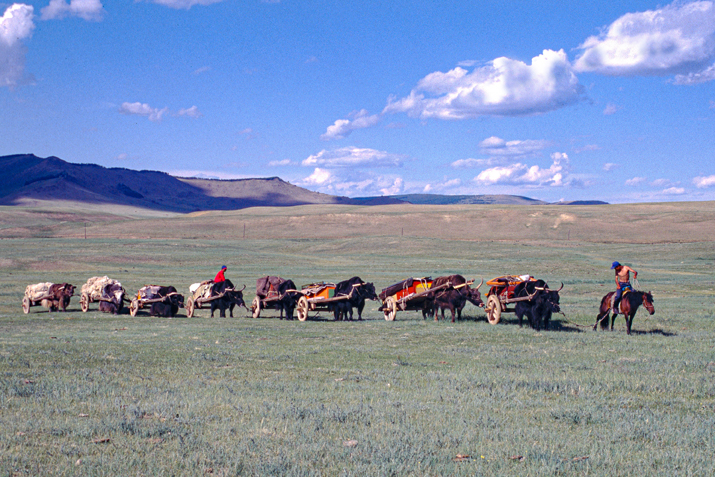
Embraced by the taiga
N 50°38'394'' E 100°11'627''
Day: 94
Sunrise:
07:59
Sunset:
18:07
As the crow flies:
15,01
Daily kilometers:
21
Total kilometers:
935
Soil condition:
Meadow, forest floor, rock
Temperature – Day (maximum):
2°C
Temperature – day (minimum):
minus 3°C
Temperature – Night:
minus 8°
Latitude:
50°38’394”
Longitude:
100°11’627”
Maximum height:
1900 m above sea level
Time of departure:
12:45
Arrival time:
18:00
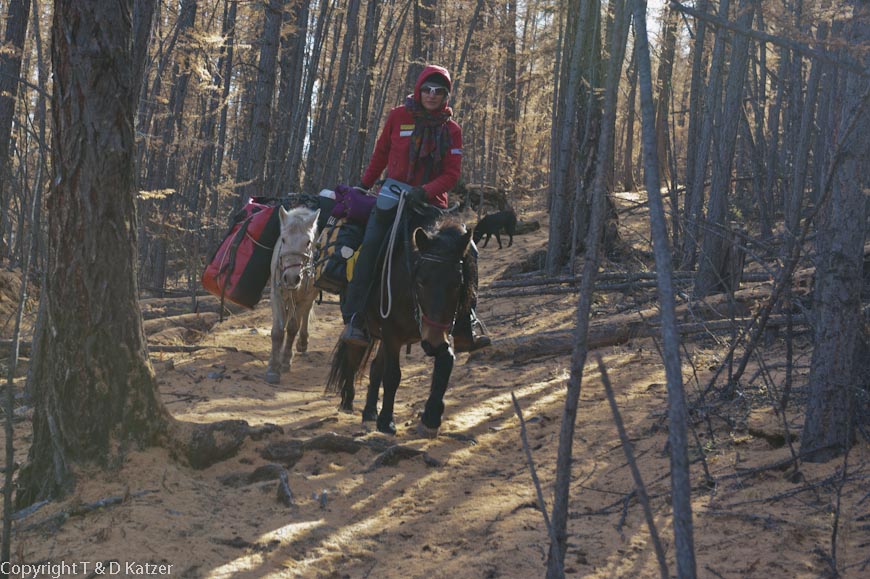
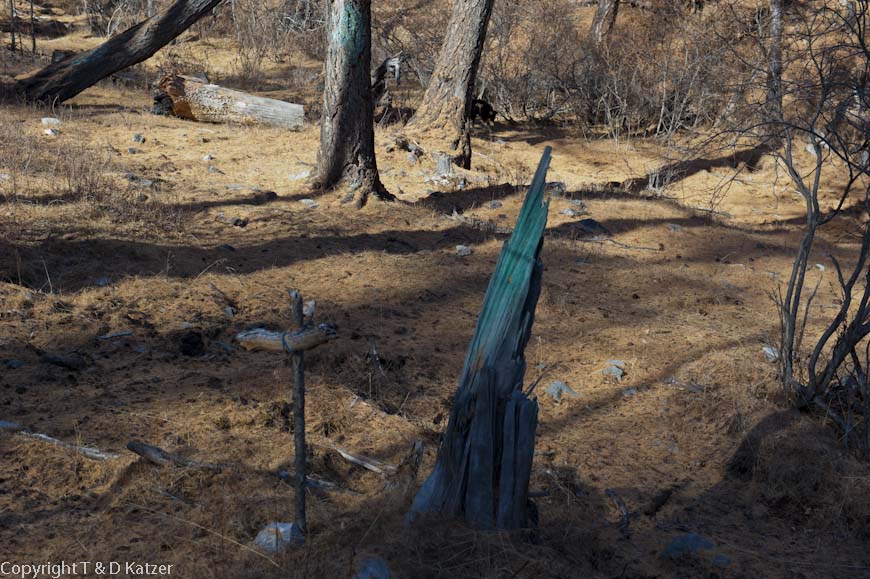
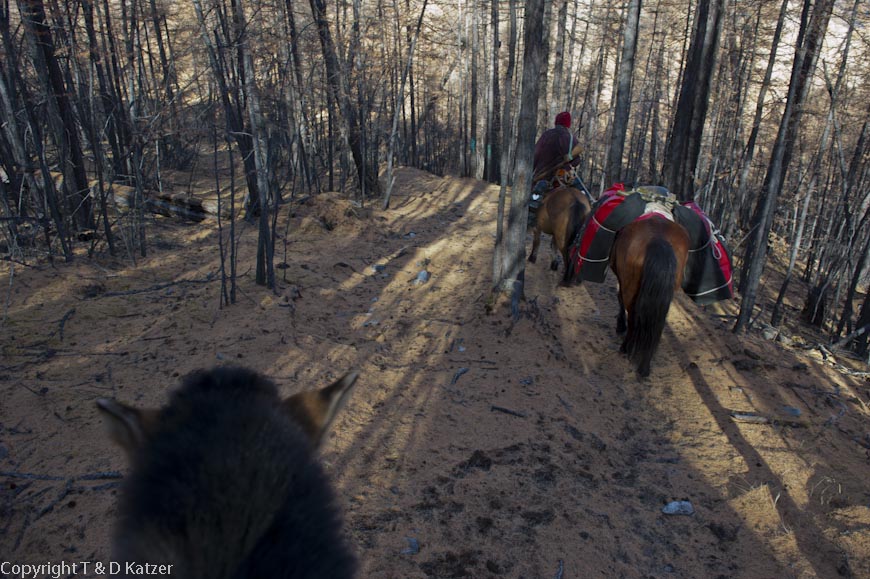
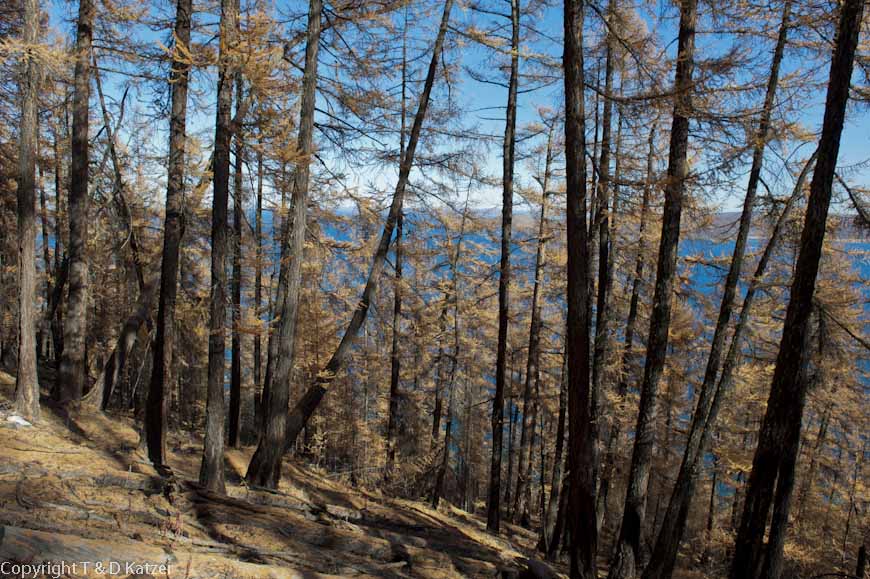

After a quiet night, without quarrelling neighbors and wolves in the camp, we welcome the sunny morning. Although the weather hasn’t changed, the day feels different than usual. The sound of the waves and the large expanse of water that spreads out in front of us are apparently the reason. They put us in a strange high spirits. I eat something different for breakfast. White bread soaked in tea and a little sugar on top. “Mmm, delicious,” I mumble, ingesting the soft jelly. There’s no question that you become humble on a trip like this. Especially when it comes to culinary delights.
Followed by a young, stray dog, we leave the camp at lunchtime as usual. “Each of you should take a packhorse. The path is too narrow to lead two, Denis,” recommends Bilgee, whereupon I give Sharga to Tanya and now only have to pull Bor. “Now that Mogi can run around as much as he likes, I was looking forward to riding without a lead in my hand. Hm, wrong thinking,” says Tanja and takes Sharga off my hands. After just a few hundred meters, we enter the dense, dark larch forest. The narrow path leads steeply upwards. The ground is criss-crossed by a network of roots hidden beneath the carpet of needles. Rocks protrude more and more often from the forest floor, scattered around in an uncoordinated manner as if a giant had thrown them. We wind our way around the trees and have to be careful not to wrap the packhorse lead rope around them. Out of the corner of my eye, I suddenly notice a movement. I turn my head to the left, to where I thought I saw movement. Nothing. There is nothing to recognize. Just a few meters further on, we hear a call through the poem. We stare in disbelief at an armed man. He sits on his horse and watches us. “Obviously a hunter,” I say to Tanja. Bilgee starts a conversation with the stranger. Again, it is about where we come from and where we are going. But above all, in which direction we need to go and whether we are on the right path. “They are simply everywhere. Even here, in the middle of the dense mountain forest, we meet people. It’s hard to believe when you consider how huge this country is and how few people live here,” I wonder, leaning towards Tanja. During the conversation, I get off Sar to adjust my slipping saddle and saddlebags. As I haven’t yet found the right solution for tensioning the Deel properly on the banana, it constantly slides to the left or right and pulls the saddlebags along with it. To avoid further sweating attacks, I now only wear it when it gets really cold. Usually in the early morning or towards the evening. The saddle straps are pulled taut, the Deel is re-laced and the ride continues. The path becomes steeper and steeper. We can only stay on the horse’s back by leaning forward up to the horse’s neck. So we balance like acrobats up the slopes. The sun’s rays peek sporadically through the branches above our heads and cast bright patches of light onto the forest floor. When we reach the taiga, we experience a drastic change in the landscape. The dog, who has been following us since the last camp, walks at a suitable distance behind or in front of the horses. Mogi has accepted her as a friend and often plays with her. “Maybe we should add her to our team?” I ponder during a short breather. “Getting two dogs through the winter is certainly not easy. It’s already a challenge to feed Mogi,” Tanja points out. “Maybe you’re right. Then we won’t give her anything to eat for now. She might then go back to where she came from,” I hope.
At an altitude of around 1,800 meters, we leave the dense forest behind us for a while. Azure blue sky arches over our heads. The gradient of the mountain becomes a little more pleasant. Now the deep blue of the lake shimmers up towards us again. The view is sublime. We can easily see the eastern side of the Khuvgul, which, with its 383.3 cubic kilometers, is the largest freshwater reservoir in Mongolia.
The time of unobstructed views is only brief as the forest swallows us up again. In its shadow, we feel like we’re sticking our heads in a freezer. The mysterious depth and gloom of the taiga breathes incessantly towards us from its icy maw. I get cold feet. Maybe three pairs of socks are too many for the shoe and the foot can’t breathe? Because of the enormous sweat flow in our winter shoes and because the sweat then freezes inside and cools the foot, we have been wearing our riding shoes again since today. We urgently need to come up with something because if the temperatures continue to fall, we run the risk of freezing our toes.
The path becomes downright hair-raisingly dangerous. Mirror-smooth tangles of roots hidden under the cover of needles, stones and rocks scattered between the tree trunks. The path winds uphill and downhill. There are always barriers in front of us. Deforested tree trunks, lichen, undergrowth and everything else a wild forest has to offer. In summer, this must be some kind of hiking trail for tourists. We often come across rough, green markings on the trunks and rocks. That’s the reason why we can ride through the forest in the first place. Without a path, there would be no way through this tangle of branches, woods and thickets. We pass a cross provisionally knocked into the ground. “I wonder who died here?” I think. Sweat appears on my forehead as Sar starts to slip from time to time. If he were to fall here, it would be unthinkable. The luggage scrapes incessantly past the rough bark of the trunks. And no matter how hard we try to protect our equipment by leading our packhorses in an arc around the obstacles. It doesn’t help. At the moment there is hardly any chance of not bumping or scraping against it. Sometimes the path ventures directly onto the lake. Only that this is about 50 meters below us. If the mule track collapsed just a little or the horse took a small misstep, it would plunge down with the rider and crash onto the rocks below. I secretly pray for our safety. Even though we have already covered many risky kilometers on this trip, this rough, sloping forest floor is the most dangerous passage so far in my opinion. Above all, it is impossible to predict how many more kilometers we will have to follow this taiga path. An hour perhaps? One day? Or even the entire 100 kilometers until we leave the Khuvsgul again in an easterly direction?
“What are you really thinking about?” I ask myself, but to be honest, I’m nervous. Far too nervous, something could go wrong here. A fatal situation in the middle of the wilderness. But that’s the way it is during an expedition. There is no net and double bottom. The only thing that can give us security is confidence and self-confidence. Trying to banish my negative thoughts and the fear that arises, I try to enjoy the beauty and originality of the forest that surrounds us.
“What a fantastic ride,” Tanja calls out behind me. “Yes, really fantastic,” I reply and sometimes wonder where she gets this composure from. Well, it’s not always being nervous or feeling fear. I hardly know such feelings. Only in a few moments, such as this one, can it happen. It is uncontrollable. Appears out of nowhere. Most of the time, however, I am not afraid. And when it comes up, it comes up at different times. This means that if Tanja gets anxious, I can reassure her with sensible arguments and it’s the same the other way round. We complement each other perfectly.
We finally reach a clearing in the afternoon. The dark forest releases us and the sun provides a little warmth. We eat a tin of fish, which we share and spread on white bread that we bought in Khatgal. We enjoy cookies and a bar of chocolate with a few cups of hot tea from the thermos flask. Then you continue through the mountain forest with renewed energy.
In the early evening, the taiga releases us from its grip. Suddenly we find ourselves on a dirt track. A lone motorcycle rattles towards us. Yurt camps are set up to the left and right of the slope. We are surprised by the strong tourist infrastructure at the end of the world. It looks like hundreds of vacationers from all over the world come here in summer.
Although we have been on the road for almost five hours, we were only able to cover 10 kilometers due to the rough terrain. Far too little to stay anywhere near on schedule. Because winter is hot on our heels, we have to cover longer distances. “Bye!” Choo! Choo!”, we urge our horses to trot in order to make up at least a few kilometers today. Bor, who lets himself be pulled from the start of the journey, almost drives me mad. He just doesn’t want to walk. My right arm gets longer and longer. Tanja rides behind me and spurs him on. “Choo! Choo! Choo-choo!” she shouts, swinging the end of a rope through the air to show Bor how serious she is. “Now I know where the word draught horse comes from!” she shouts with a laugh, which I can’t reply to at the moment. In the meantime, another three or four dogs follow us alongside the bitch. Their owners have probably moved to warmer climes. Apparently they see us as a chance to survive the coming winter. Humans are synonymous with food and warmth. The dogs, one more beautiful than the other, have formed a real gang. They now hunt large yaks and everything that creeps and flies. Thank goodness there are no sheep or goats here. “If we carry on like this, we could open a zoo!” Tanja exclaims with a laugh.
With great effort we keep our horses at trotting speed. Soon we are desperately looking for a suitable place for our evening camp. Here, too, there is hardly any lush pasture for our horses. To make matters worse today, the strong, unrelenting wind is blowing from the eastern shore across the water, which is considerably cold.
Away from the lake, on an embankment next to the forest, we find what we are looking for. There is little low grass to eat. But better than nothing. The challenge of keeping our horses fit despite the effort is greater than I thought. Bilgee continues to do a fantastic job. As soon as the tents are up, he drives them to the lakeshore. They can quench their thirst there. Then he pegs them in a row around our tents so that we can see them at a glance from the tent entrance during the guard shifts. Tanja fetches water which freezes in the water bags just minutes later. We usually can’t get the twist locks open after just a few minutes. They are too frozen. So the work is becoming more instead of less. Every day this trip brings new problems that we have to solve together. I peg Mogi between Bilgees and our tent. That way he can’t get up to any mischief overnight and at the same time look after the equipment that we can’t get into the tents. The dog and her new clan are still close to the camp. They don’t dare to beg, but lie about 30 meters away from the tents and stare incessantly at us. I seriously feel sorry for them. Especially with the black bitch and would like to give her something to eat. But Mogi alone gives us enough trouble because of his hunting instinct. A second dog doesn’t make the situation any easier.
Only a little later we get a taste of the pack of dogs around our camp. They bark each other into a rage. As Mogi is lying directly in front of our tent, his barking is the loudest. “Mogi, shut up!” I yell, annoyed. But he doesn’t react. Just doesn’t take me seriously. “I’ll show you,” I say angrily, unzip the tent and fling my seat cushion in his direction. He falls silent immediately. The others, however, continue to yap vigorously into the moonless night sky.
We look forward to your comments!

